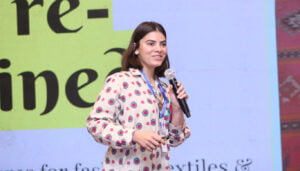Mifuko found designer bag makers in Kenya

Mifuko has its products manufactured in small African workshops. Finnpartnership’s Business Partnership Support helped launch these imports, which generate extra income for poor craftspeople.
Mifuko Oy is a design company owned by two graduates of the School of Art and Design, designers Minna Impiö and Mari Martikainen. Their business concept combines Scandinavian design with traditional African handicrafts. It all began in 2008, when Impiö and her family moved to Nairobi, the capital of Kenya. The local craftspeople’s skilfully made artworks and inventive use of recycled materials inspired both designers.
“We wondered if Kenyan craftspeople could start making designer products according to Finnish designs,” says Mari Martikainen.
Finnpartnership helped get things off the ground
Finnpartnership supported Mifuko in its search for partners, and also in refining its business concept.
“This support enabled me to make week-long business trips to Kenya. We took full advantage of these opportunities by running practical workshops and developing our products in cooperation with local partners. This enabled us to build up an extensive product range in only a short period of time,” says Martikainen.
The designers’ range consists of bags, sandals and jewellery. Mari Martikainen is responsible for sales and marketing in Finland. Minna Impiö supervises manufacture in Kenya and monitors product quality. A regular, local presence also ensures that craftspeople’s wages and working conditions remain in accordance with agreements.
“All products are manufactured not only ethically, but also in an environmentally sound manner.”
Innovative use is made of a variety of recycled materials. For example, sandal soles are made from used vehicle tyres and old men’s shirts continue life as bag linings.
Network of about a dozen workshops
Finding partners initially required a lot of legwork. The designers made contacts through a range of different channels.
“For example, we’d seen an interesting product for sale and then asked who made it. Another partner we found by googling.”
Forging successful business partnerships takes time. The designers have also come across workshops with below-standard working conditions and no real potential for cooperating on improvements. They couldn’t, therefore, consider going into partnership.
“And at other times, our notions of quality have differed so much that we’ve been unable to continue in the partnership.”
Mifuko currently has a network of about a dozen workshops. These include everything from one-person businesses to workshops employing twenty-odd craftspeople. Some of the workshops also employ disabled people.
Mifuko focuses on designer products
Mifuko intends to continue focusing on high-quality designer products with low sales volumes. This must be considered when importing products into Finland.
“Filling an ocean freight container with our products would take a very long time, so the only sensible option is airfreight.”
Martikainen says that the red tape surrounding imports has been fairly uncomplicated at the Finnish end. The process is also made easier by the fact that Kenyan craftwork does not incur import duties in the EU markets.
Martikainen acquired retailers by phoning stores that could be potential stockists. She currently has a network of twenty-odd retailers across Finland. Products are also available directly from the Mifuko website.
“Our products are sold in design stores such as Artek and Design Forum Finland. They can also be found in ecostores.”
Business ethics highly significant
A variety of customer groups are united by critical consumption. Product design is more important for some, while ecological values weigh more heavily with others.
Mifuko is constantly developing new products. Products are also designed to meet customers’ wishes. The number of corporate customers is also increasing. For example, Mifuko is developing a customised product bag for a Finnish manufacturer of top-end speakers.
In the future, Mifuko also intends to look into international markets. Its first step in this direction will occur at next year’s international trade fair in Dortmund.
Mifuko’s business concept is gradually beginning to generate income for its shareholders. Martikainen is also pleased to be involved in running an ethical, sustainable business.
“Providing employment is the best way to help people. We can see for ourselves how work has brought people happiness, increased their self-esteem, and given them a future.”
Share on social media


